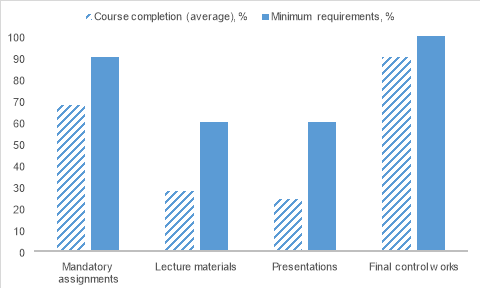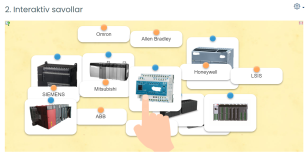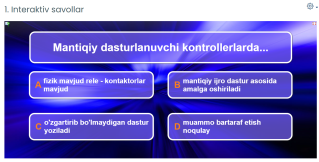In this study, the existing problems and solutions in the creation of e-learning resources in higher education institutions are highlighted.
Keywords: education, e-learning, learning management systems, assignments, comparison.
The process of informatization of modern society is characterized by the improvement of modern information and communication technologies. One of the most important issues in the implementation of the set goals is the use of innovative technologies used by foreign universities and the development of mechanisms for the introduction of educational technologies in our national education system based on a strategic plan.
The Decree of the President of the Republic of Uzbekistan «On approval of the Concept of development of the higher education system of the Republic of Uzbekistan until 2030" states that the following measures will be taken to introduce digital technologies and modern methods in the educational process:
— ensuring a strong integration of modern information and communication technologies and educational technologies, creating additional conditions for the continuous development of professional skills of teachers in this area;
— individualization of educational processes based on digital technologies, development of distance learning services, the widespread introduction of the webinar, online, «blended learning», «flipped classroom» technologies;
In the process of higher education, it plays an important role in ensuring the compatibility of electronic and traditional educational technologies based on the concept of Blended learning, formed based on advanced foreign experience. It will also lead to a sharp reduction in government spending based on the effective use of open e-learning resources proposed in the research.
Currently, there is a lot of discussion about the organization of classes in educational institutions engaged in the distance and independent learning. Based on the results of a survey conducted in higher education institutions, the type of training is conducted in parallel: in educational networks (Moodle LMS, Google Classroom) and social networks (for example, telegram). In the comparative analysis, the criteria of test questions and inquiries, the level of audience coverage, the organization of virtual laboratories, backup, the possibility of working offline were considered. In the field of education, it is possible to cover a certain category of students. This option significantly simplifies the optimal control of groups, sorting tasks, evaluation (Table 1).
Table 1
|
Opportunities |
Social networks |
LMS |
|
Work in group |
+ |
+ |
|
Various quizzes and surveys |
+ |
+ |
|
Presenting virtual laboratories |
- |
+ |
|
Backup / recovery contents |
- |
+ |
|
Working off-line mode |
- |
+ |
|
Plagiarism checking |
- |
+ |
|
SCORM package support |
- |
+ |
Reasons to distract the audience in social networks are sufficient and are a major factor in reducing the quality of education. Education networks (LMS) only serve to increase the level of mastery of students as they are focused on learning.
In the context of the COVID19 pandemic, much of the e-learning resources created in higher education institutions have become very boring and meaningless. The fact that students completed only mandatory assignments and lost interest in the remaining course elements raised the issue of modifying these resources.

Figure 1. Average course completion by students and minimum requirements (on the example of the Shahrisabz branch of the Tashkent Institute of Chemical Technology)
Figure 1 shows the indicators of students' completion of general organized and unprocessed e-learning resources in 2020 at the Shahrisabz branch of the Tashkent Institute of Chemical Technology. According to the initial minimum requirements, the assignments and final control works were to be completed and the lecture elements were to be mastered (60 %) by the students.But according to semester-end statistics, students mostly completed mandatory assignments and exams.
Solutions to these problems include increasing the variety of assignments, improving course content, and using interactive methods. As a result, students become interested in the course. Copying by students can be prevented by randomly distributing assignments or quizzes to students and adding plagiarism modules to the e-learning platform.
As an example in the development of e-learning resources, the subject «Introduction to Programming for Engineers» was chosen for 5311000 — «Automation and control of technological processes and production» the bachelor's specialty.


Figure 2. Various interactive quizzes are used in the e-learning platform
One of the main requirements of the course is to provide incentives for each work performed by the student in the e-learning resource, the provision of different case stages after each stage.
Each topic included the following course elements:
— Introductory tasks on the topic;
— Lectures (with the choice of reading and downloading);
— Video materials (streaming services are selected as a source);
— Virtual laboratories (optional);
— Interactive questions (optional);
— Mandatory assignments;
— Independent work assignments;
This method resulted in students obtaining the course with interest and fully completing the minimum requirements outlined above. Given that one of the most important issues in distance and evening education, especially in pandemic quarantine conditions, is the organization of quality distance education, which is one of the subjects of the higher education system, advanced modern methods for improving the content of curricula in relevant educational disciplines and a mechanism for organizing distance learning through e-learning courses that provide skills in working with technology.
References:
- Бегимқулов У. Ш. Замонавий ахборот технологиялари муҳитида педагогик таълимни ташкил этиш. // “Педагогик таълим” жур, № 1, 2004.
- Захарова О. А. Развитие корпоративного обучения: от «e-Learning» до «weLearning» // Международный электронный журнал «Образовательные технологии и общество (Educational Technology & Society) 2013, том 16, № 2, С.529–546.
- Мирсолиева М. М. “ОТМда ўқув жараёни ва ўқув-услубий фаолиятни модернизациялаш ва инновацион таълим технологияларини жорий этиш”. Модул. Т.: БИММ, 2015.







